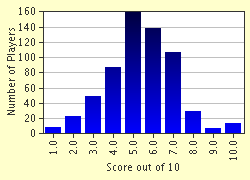Quiz Answer Key and Fun Facts
1. What was "Asdic" whose development was first recorded in 1939?
2. What was a "Blattnerphone"?
3. From the attack on which city does the term "fifth-column" first come into the language?
4. What extra specific meaning did the term "guinea-pig" come to have during World War II?
5. Which of the following items of underclothing was NOT first entered into the dictionary during the 1930s?
6. What sort of town was a "Hooverville"?
7. From which popular game did the slang term "screwball" meaning an eccentric or irrational person originally derive?
8. Which vivid color was introduced into the language by Italian-born fashion designer Elsa Schiaparelli?
9. What would you do if you started to "simonize"?
10. In the U.S.A. in the 1930s what would you expect to find a "thumber" doing?
Source: Author
Philian
This quiz was reviewed by FunTrivia editor
agony before going online.
Any errors found in FunTrivia content are routinely corrected through our feedback system.

